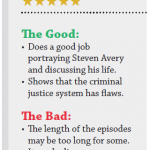Avery’s Story: Making a Murderer Review
One of the most controversial documentaries I have ever seen, Making a Murderer, directed by Laura Ricciardi and Moira Demos, documents the events of Steven Avery and his questionable imprisonment on two different cases by the Manitowoc police.
The documentary does a good job detailing Steven Avery’s life. It mentions his early childhood and upbringing, and what he had once done for a living, working at his family’s scrap yard in Manitowoc county, Wisconsin. Steven’s problems began when he assaulted his cousin, in response to her spreading rumors about him, calling him a pervert. After the police get involved it is revealed Steven’s cousin is married to the sheriff. This incident is followed by future events discussed in nine other episodes filled with tragedy, corruption, and negligence.
Each episodes’ run time is around fifty minutes. So prepare to dedicate some time to watch this series. The fifty minute run time I found, was never really an issue because the documentary was constantly engaging and never boring. All the information provided never felt rushed and was very well fleshed out. The documentary continues at a steady pace and chronologically follows Steven Avery’s story, with his wrongful incarceration of 18 years, and the current situation he is in.
Though the information provided is well put together, it is also one-sided. When the documentary discusses the story of Steven Avery, all interviews were mainly of those close to Steven who agree that he is innocent. When it came to discussing the cases and the evidence used, the documentary makes it look like the police were corrupt and purposely tried to blame Steven for the crime. One example of incriminating evidence used to incarcerate Steven was witness testimonies. During this process the documentary showed that the police seemed to be leading the witness by showing old photos of Steven that match the description of the actual perpetrator. There is no question that the police mishandled the case, but I wished that the documentary did a better job of showing the police’s side of things.
Things really begin to get controversial with the second half of the series. After Steven is released from prison as a result of new evidence that proved his innocence, he decides to file a lawsuit against the Manitowoc police. A couple days after the lawsuit begins, an incident occurs and Steven is again sentenced to prison.
Similar to the first half, the second half covers the events of this second case and the methods used by the police. However, a prime focus for this latter part of the series is corruption instead of mishandling. The documentary gives the viewer information regarding the case, including evidence planting by the police, and a few interrogation scenes where the police attempt to strong arm Steven and his relative into admitting guilt. In a video review done by Jeremy Jahns on YouTube, he describes this situation as a “conflict of interest” due to the fact that Steven is filing a lawsuit against the Manitowoc police department and the Manitowoc police happen to find most of the evidence. The series then ends with a question on whether or not Steven did the crime and if the police had set it up to place the blame on Steven.
In the end, Making a Murderer is a must watch. It shows how the criminal justice system isn’t perfect and how police are capable of making mistakes. It makes you as a viewer reflect on the series and think about what you just watched.








